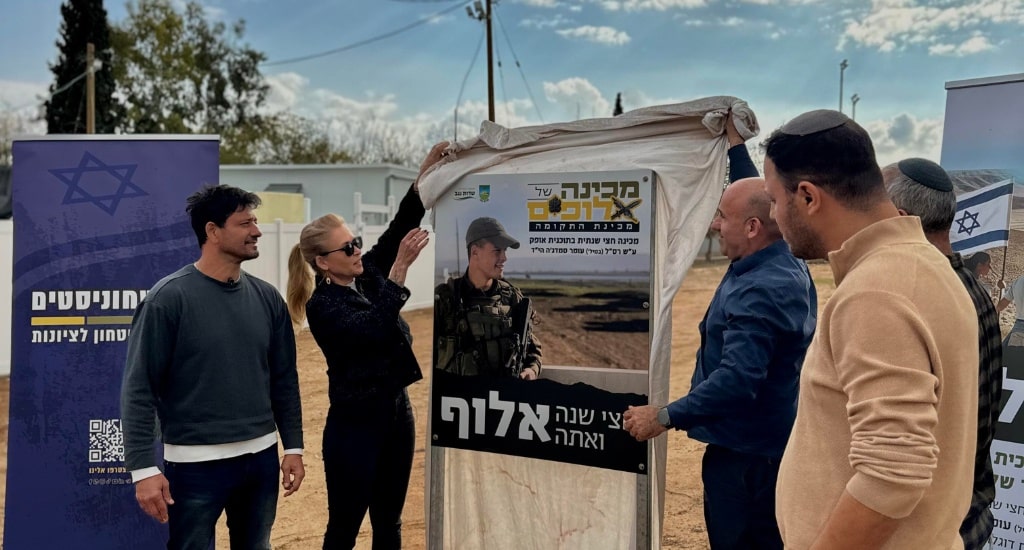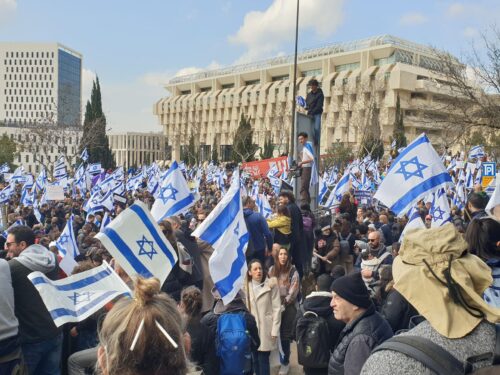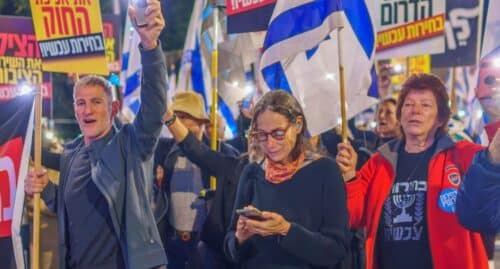
Nowadays, one would be hard pressed to come up with slurs that have not been hurled already at Generation Tik Tok. It is said that that it is shallow, selfish and mentally feeble; That it lacks true connection to nation and country; that it wants for ethics and morals, and has no purpose and aspirations.
Then came October 7, and shattered that impression of Israeli youth.
“Suddenly, it became evident that Israeli youth is not the problem, but rather the solution”, says Major Matuko Alamu, head of the Tkuma pre-military preparatory program. “Our youth isn’t vapid and morally weak. On the contrary – it seeks meaning, purpose and the realization of its potential. In one moment, it understood that Israel is back in 1948 and we are once again facing a war of independence that calls on all of us to step up to the flag, and protect the very existence of the Jewish national home. It was able to put aside differences of opinions, and it united to carry on its shoulders the protection of national security. The current [security] system suffers from issues that had cultivated a general misconception regarding the superiority of Israel’s military and intelligence and the deterred state of Hamas. The ideological youth, which exhibited a strong sense of purpose and mission that arose in the wake of October 7, is the key to change”.
From under the veneer of materialism and “Me–ism”, explains Alamu, rose a generation that responded to the call to the flag and shined in the most brilliant light it could – committed and willing to sacrifice itself for the protection of Israel, united above any sectoral or political divide and with a strong and deep sense of belonging to the Jewish nation and country.
“In one of the most difficult times in the history of the State of Israel, we have been discovering what a fabulous future the Zionist cause can have, if only we enable it and help it grow. This is exactly the reasoning behind the Tkuma preparatory program”.
Cultivating the next generation – aimed at the defense of state, united, committed
The Tkuma pre-military preparatory program named after Sergent Major Omer Smadga May his Memory be Blessed, is one of the flagship initiatives of the IDSF HaBithonistim movement and was created with the aim of cultivating the IDF’s future generation of commanders – proactive, determined, ready to be on the offense, ideological and committed to Zionist security values, to ensure that the worst failure in the history of the State of Israel will never happen again. The choice of the location – the Tkuma moshav – is far from coincidental, as it is one of the communities that was attacked by the Hamas terrorists on October 7 and its members consequently evacuated.
“It was very important for us to educate and encourage the young generation to come live in the Gaza envelope communities”, says Alamu, “to boost agriculture in the moshav and the area and play a role in the rebuilding of Israel’s border communities”.
The directorship of the Tkuma pre-military preparatory program is just one in a long track-record of positions Alamu (40) has filled in non-formal education. Alamu had immigrated to Israel by walking from Ethiopia to Israel by way of Sudan, in an arduous journey that began when he was just three years old and ended when he was seven. In Israel, he grew up in the town of Ofakim and went to the religious school – yeshiva – in Hebron.
In the army Alamu served as a fighter and commander in the Paratroopers Brigade, now a Major in reserves in the airborne evacuation unit, also serving as a counselor and evaluator in special forces tests. He has a BA in management and public policy and has over ten years’ experience in non-formal education, as a counselor and coordinator in the Bnei Akiva religious youth movement and director of a number of pre-military preparatory and leadership programs. He lives in Ofakim with his wife Anat and their five children.
Against this background, Alamu’s appointment as the Director of the Tkuma program was almost inevitable. Not only has he dedicated his life to security and education – the interconnectivity of which the program focuses on – but he also personifies the three unique aspects of the program: a clear security perception, the interconnection of all parts of Israeli society, and deep commitment and dedication to the Israeli people and country.

The First IDSF Habithonistim Preparatory Program in Israel
The Tkuma program is the only one of its kind that offers the involvement of senior officers from the security establishment. The members of the IDSF HaBithonistim movement, which served in the high ranks of the security apparatus, in commanding, combat and management capacities, will be part of a unique mentorship track. They will cultivate the deep comprehension of the military occupation and the Zionist aspect of Israel’s security doctrine, preparing the cadets to meaningful service in the IDF’s spearhead units and positions.
What is special about this mentorship?
“The IDSF HaBithonistim mentors will provide each cadet with an envelope of mentoring and guidance that will be personally tailored, not only during the term of the program but also later, during her or his military service. They will be there to guide, advise and help achieve the goals each cadet sets for themselves, while assisting to fulfill military duties in the optimal manner, including courses, selection of the desired officers’ training, and more. The cadets will be able to continue benefitting from the mentoring and guidance of the movement throughout their lives – even years after they end their military career.”
What kind of focus will the issue of security get in the program?
“Our curriculum includes an in-depth introduction to the national security doctrine of the State of Israel, the defense establishment and the defense industries, and will also place special emphasis on physical fitness and physical and mental preparation for assuming leadership roles and achieving meaningful military service. Whether they join elite forces, in combat roles in the infantry or in the 8200-intelligence service, the goal for them will always be to make the most of their abilities and contribute as much as possible to people, society and the country“.
How actually was the initiative born to found a preparatory program that would focus equally on education and security?
“Education is the central pillar of our existence as a nation, and in turn – of Israel’s security. Therefore, since the establishment of the IDSF HaBithonistim movement five years ago, it has been investing a considerable portion of its enterprise in education, among others in participating in various pre-military preparatory programs, and conducting pre-military talks in high-schools across Israel, in collaboration with the Education Ministry and the government. The establishment of the Tkuma preparatory program is the natural evolution of this involvement. October 7 made it clear that time is of essence in putting this into action”.
Part of the program’s stated vision is teaching security in the broadest sense. What does that mean?
“The military aspect is only one pillar of strong and lasting security. Our security is also based on an independent economy, diplomacy, the settlement of population in strategic areas of the country, social cohesion and education for Zionism. The preparatory program aspires to provide the students with the deep understanding of the interdependence between all these areas and their vitality for the future of the country.”

Reuniting Israeli society
An additional aspect of the Tkuma pre-military preparatory program is its rich and divers human tapestry, which makes it a microcosmos of Israeli society.
“Many such programs do much good”, says Alamu. “But unintentionally they produce a cookie-cutter type of graduates. Our program, on the other hand, will truly encompass all walks of Israeli society – men and women, religious and non-religious, residents of affluent central Israel and from its geoeconomic periphery. This is one of the most important lessons from the state of affairs in our society on October 6 – that a way must be found to reunite Israel’s fragmented society, finding that which unites us in order to strengthen our social cohesion and eliminate the polarization and social discord. It’s clear to me that our rebirth as a strong united nation will grow from the cultivation of values and unity, which are inalienable elements of our national security, as is the connection to the land and working the land – and this is the path of the Tkuma program. For me this is a great honor to be part of the effort to shape the collective national perception among the young generation and to instill in them the belief in our right to live in this land”.
The Tkuma preparatory program: Omer’s legacy
The ideological vision of the Tkuma program reflects the jolting crucial wakeup call that Israeli society received on October 7.
“We witnessed a sudden mass mobilization of the entire nation. People who’ve found a way to shirk their reserves service for years had suddenly showed up to volunteer for duty, and the rate of enlistment was so high that the base supply stores couldn’t keep up with demand for gear and uniforms. We suddenly remembered that we’re part of a nation, of a society, of a bigger story, and not just a random group of individuals, but a collective, and that true self realization demands the contribution to the collective to which we belong”.
The Tkuma program is named after Lt. Col. (res.) Omer Smadja, the son of the famous judoka Oren Smadja, who was killed in battle in the Gaza Strip in June 2024. How did his character and the legacy he left behind reflect these values?
“One of the amazing and inspiring things about Omer’s story is that despite his difficult struggle with attention and concentration deficits, as a result of which he studied in special education, not only did he not give up on realizing his aspirations – but he also chose to do everything in his power to contribute to others – country and society. Not only did he overcome his difficulties, but he also chose to volunteer at the Magen David Adom emergency medical services, to be a cadet in a pre-military preparatory program, to volunteer to service in the IDF, to donate bone marrow, and all the time to give, in more and more ways. In other words, he was always a champion.”
Is that really your slogan – “Program for Champions”? What does that mean?
“Omer, may he be in blessed memory, was an example that in order to be a champion, you don’t need the rank, but rather the strength and perseverance to set goals and objectives every day and strive to meet them, no matter what age and stage of life we are at. It was enough to hear his father, Oren Smadja, eulogize him at the funeral and call on IDF soldiers to continue moving forward and stick to the goal, in order to understand what kind of upbringing Omer had. At the same time, it must be remembered that these goals must be realized within the community, society, and country. A champion is someone who not only excels in everything he or she does, but also someone who chooses to take on leadership positions and contribute to the common good. In the communal living at the Tkuma program, in which the students are together 24 hours a day, this can also materialize in the smallest everyday actions – taking care of your friends, taking responsibility without being asked and stepping up to take on tasks, for example – washing dishes for everyone – rather than trying to shirk responsibility”.
And this is only the beginning
The Tkuma pre-military preparatory program is far from the end of the line of the IDSF HaBithonistim movement’s initiatives. The movement’s educational vision stretches far beyond this single enterprise: “We want the program to have an influence on our graduates for the rest of their lives. It is imperative that they continue playing an active role in the settlement of Israel, by founding more communities and boosting existing ones across Israel. Wherever the need arises for helping hands for security or settlement – we’ll be there”.






